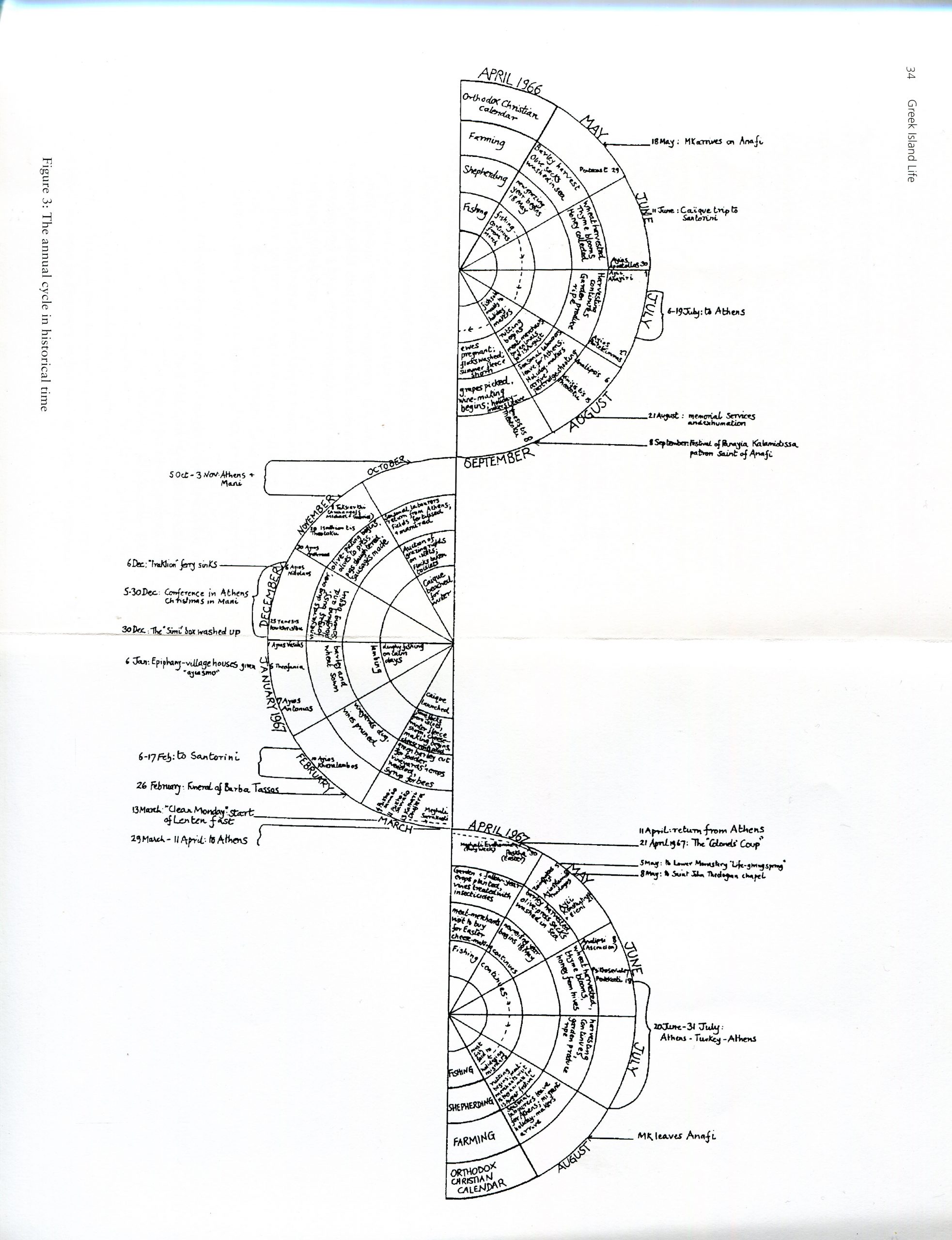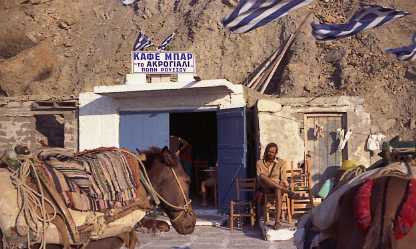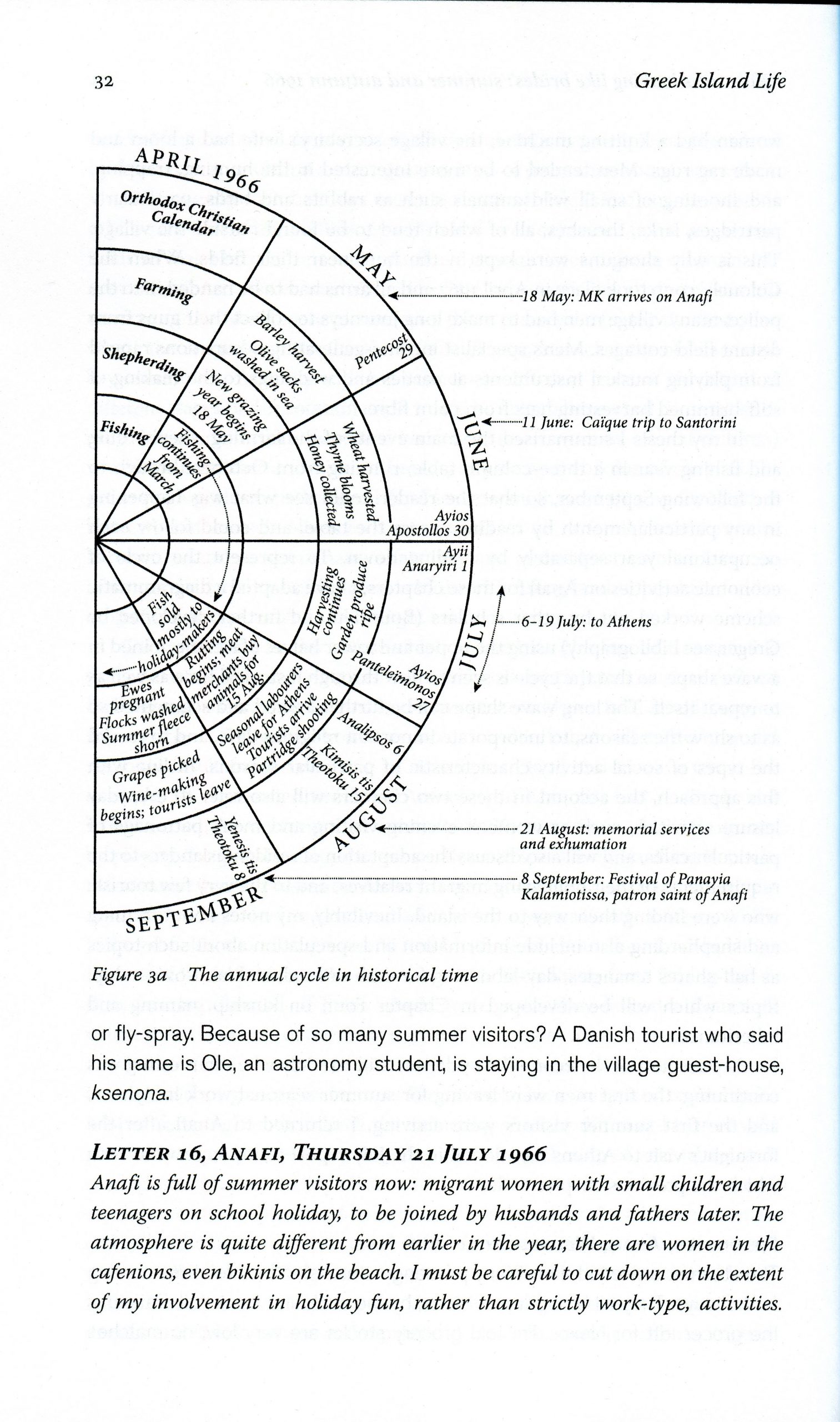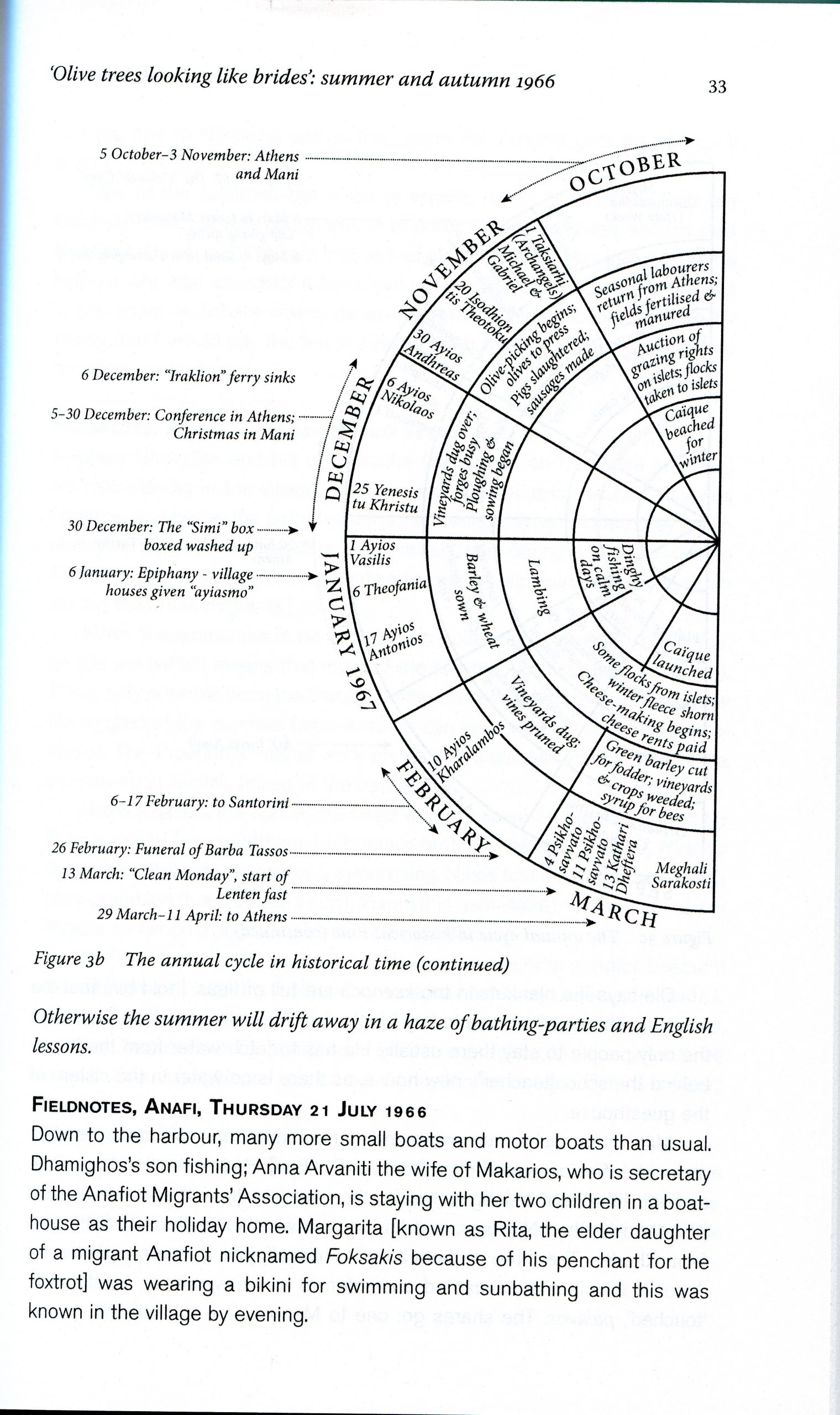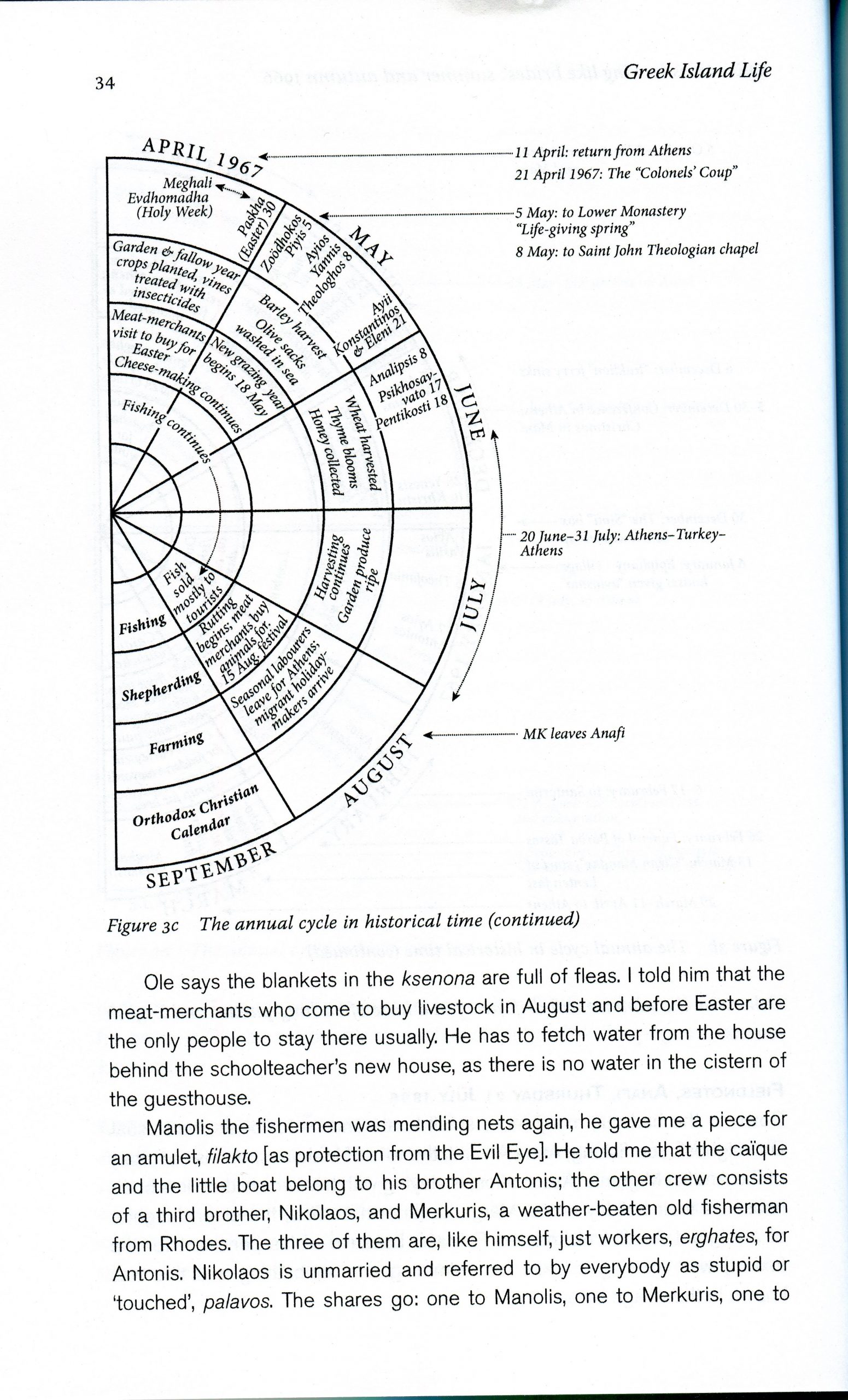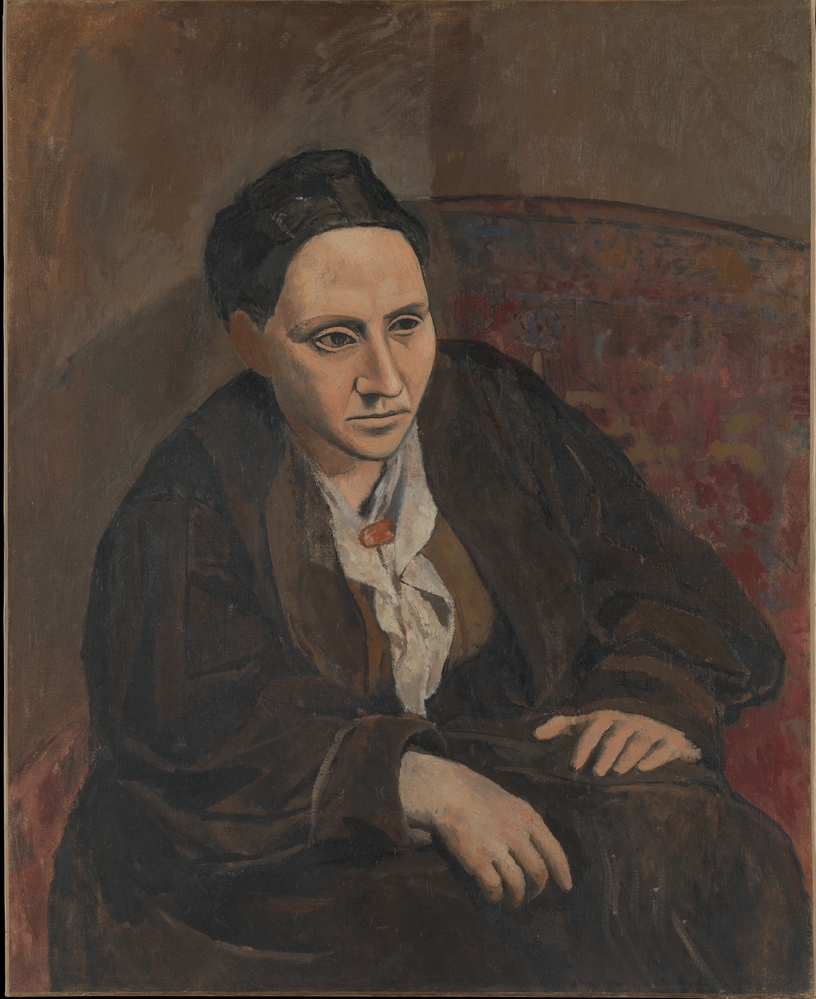α
FORMS OF INTERRUPTIONS…
POINTS OF RESISTANCE
…moments of asynchrony, anachronism, anastrophe, belatedness, compression, delay, ellipsis, flashback, hysteron-proteron, pause, prolepsis, repetition, reversal, surprise, and other ways of breaking apart what Walter Benjamin calls “homogeneous empty time”.
Elizabeth Freeman, Time binds – queer temporalities, queer histories, xxii, Duke University Press, 2010.
THE ANNUAL CYCLE IN HISTORICAL TIME
In my thesis I summarised the main events of the farming, shepherding and fishing year in a three-column table, running from October [1966] through to the following September, so that the reader could see what was happening in any particular month by reading across the table, and could follow each occupational year separately by reading down. To represent the cycle of economic activities on Anafi for these chapters, I have adapted a diagrammatic scheme worked out by other scholars (Bourdieu and further developed by Greger, see bibliography) using the upper and lower halves of a circle, joined in a wave shape, so that the cycle is seen to flow through historical time as well as to repeat itself. The long wave shape can be further arched and segmented so as to show the seasons, to incorporate important religious days, and to record the types of social activity characteristic of particular seasons. In line with this approach, the account in these two chapters will also refer to everyday leisure activities, such as women’s evening visiting and men’s patronage of particular cafés, and will also discuss the adaptation of resident islanders to the requirements of their holidaying migrant relatives, and to the very few tourists who were finding their way to the island. Inevitably, my notes about farming and shepherding also include information and speculation about such topics as half-shares tenancies, day-labouring for cash or kind, and land-ownership; topics which will be developed in Chapter Four, on kinship, naming and inheritance. My account of the economic cycle starts in late July when harvesting was continuing, the first men were leaving for summer seasonal work in Athens, and the first summer visitors were arriving.
Margaret E. Kenna, Greek Island Life, Fieldwork on Anafi, second edition, 31, Sean Kingston Publishing, 2017.
A RECONQUEST OF TIME
What establishes the durability of domination but also what is common in the time of “master narratives” and to those who claim to have abolished them, is a division within time itself. For time is not simply the tense line between the past and the future, a line that can be loaded with promises or brought back to its nakedness. It is also a hierarchical distribution of life forms.
The hierarchy of times, which is the basis of the rationality of human action, corresponds to a hierarchy of places which separates two categories of human beings. There are those who live in the time of events that can happen, the time of action and its ends, which is also the time of knowledge and leisure … And there are those who live in the time of things that happen one after another, the shrunken and repetitive time of those who are called passive or mechanical people, because they live in the universe of simple means without having a share of the ends of the action nor of the end in itself of leisure. The rationality of the horizontal course of time rests on a vertical hierarchy that separates two forms of life, two ways of being in time, one could simply say: the way of those who have the time and the way of those who do not. […] This is why emancipation is first and foremost a reconquest of time, another way of inhabiting it. […] Reclaiming time is then transforming this succession of hours where nothing must ever happen in a time marked by a multitude of events. […]
There are interruptions of the normal course of hours and activities, […] there is the time of the assembly which symbolizes an alternative community and the time dedicated to the organization of a daily life both ordinary and settled in a space-time of secession. And there is the effort to install over time these moments of reconstruction of a communal form of life within the experiences of production, exchange, circulation of information, transmission of knowledge and dispensation of care that weave networks of solidarity inside the conflict of the present which is also the anticipation of a form of life yet to come, a form of communal life free from the hierarchy of times and capacities.
Jacques Rancière, Les temps modernes, 13 and 47, La fabrique, 2018 (informal translation by I. Kerenidis).
TIME-SENSE IS TROUBLING
Now there is still something else the time-sense in the composition. This is what is always a fear a doubt and a judgment and a conviction. The quality in the creation of expression the quality in a composition that makes it go dead just after it has been made is very troublesome. The time in the composition is a thing that is very troublesome.
If the time in the composition is very troublesome it is because there must even if there is no time at all in the composition there must be time in the composition which is in its quality of distribution and equilibration. In the beginning there was the time in the composition that naturally was in the composition but time in the composition comes now and this is what is now troubling every one the time in the composition is now a part of distribution and equilibration. In the beginning there was confusion there was a continuous present and later there was romanticism which was not a confusion but an extrication and now there is either succeeding or failing there must be distribution and equilibration there must be time that is distributed and equilibrated. This is the thing that is at present the most troubling and if there is the time that is at present the most troublesome the time-sense that is at present the most troubling is the thing that makes the present the most troubling. There is at present there is distribution, by this I mean expression and time, and in this way at present composition is time that is the reason that at present the time-sense is troubling that is the reason why at present the time-sense in the composition is the composition that is making what there is in composition.
And afterwards.
Now that is all.
Gertrude Stein, Composition as Explanation (excerpt), Hogarth Press, 1926.
